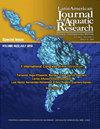酵母粘红酵母作为天然免疫和氧化应激相关基因的调节性因子在生物絮团系统中培养的nilochromis
IF 0.8
4区 农林科学
Q3 FISHERIES
Latin American Journal of Aquatic Research
Pub Date : 2022-11-01
DOI:10.3856/vol50-issue5-fulltext-2937
引用次数: 0
摘要
研究了红曲霉活酵母对在Biofloc系统中培养的尼罗罗非鱼幼鱼的影响。在为期12周的喂养试验后,对生长性能、先天反应和相关氧化应激基因的表达进行了评估。在传统罗非鱼培养基(对照)、Biofloc培养基(BFT)和添加1×106CFU g-1(BFT+Rg)活酵母的Biofloc中评估了三个实验处理,每个处理重复四次。在所有情况下,商业食品都提供给生物体(32%的蛋白质和5%的脂质)。尼罗O.niloticus幼鱼(7.02±0.04g)被随机分布在12个水箱中,每个水箱有15只动物。与其他处理相比,BFT+Rg处理的体重增加显著增加。在Biofloc条件、BFT和BFT+Rg处理下,富尔顿的条件因子、饲料转化率和肝体细胞指数显著改善。存活率无显著差异。凝集素直接影响肝脏和肠道中的基因表达。与其他处理相比,BFT+Rg处理的肝脏中tnfa、tgfb、hsp70和gpx基因的表达显著增加。同样,在BFT+Rg处理中,发现肠道il1b、tnfa、tgfb、trf、hsp70gpx和cat的表达模式显著增加。基于罗非鱼的性能和免疫反应,本研究建议在Biofloc养殖中使用粘性红细胞作为提高罗非鱼生产力的策略。本文章由计算机程序翻译,如有差异,请以英文原文为准。
Yeast Rhodoturula glutinis as a modulator of innate immune and oxidative stress-related genes in Oreochromis niloticus cultured in a Biofloc system
The effect of live yeast Rhodoturula glutinis was evaluated on juvenile Oreochromis niloticus cultivated in a Biofloc system. Growth performance and the expression of innate response and relevant oxidative stress genes were evaluated after a 12-week feeding trial. Three experimental treatments were evaluated in a conventional tilapia culture (control), Biofloc culture (BFT), and Biofloc with the addition of the live yeast R. glutinis 1×106 CFU g-1 (BFT+Rg), with four replicates per treatment. In all cases, commercial food was supplied to the organisms (32% protein and 5% lipids). O. niloticus juveniles (7.02 ± 0.04 g) were randomly distributed in 12 tanks, each with 15 animals. BFT+Rg treatment showed a significant increase in weight gain compared with the other treatments. Significant improvements were found in Fulton's condition factor, feed conversion rate, and hepatosomatic index under Biofloc conditions, BFT, and BFT+Rg treatments. No significant differences were observed in survival. R. glutinis directly influenced gene expression in the liver and intestine. The expression of tnfa, tgfb, hsp70, and gpx, genes in the liver significantly increased in the BFT+Rg treatment compared with the other treatments. Similarly, a significant increase was found in intestinal il1b, tnfa, tgfb, trf, hsp70 gpx, and cat expression patterns in the BFT+Rg treatment. Based on the performance and immune response, the present study suggests the use of R. glutinis as a strategy to increase the productivity of tilapia in Biofloc culture.
求助全文
通过发布文献求助,成功后即可免费获取论文全文。
去求助
来源期刊

Latin American Journal of Aquatic Research
FISHERIES-MARINE & FRESHWATER BIOLOGY
CiteScore
1.70
自引率
10.00%
发文量
44
审稿时长
4-8 weeks
期刊介绍:
Latin American Journal of Aquatic Research- LAJAR is the continuation of the journal Investigaciones Marinas (1970-2007) and is published since 2008 by the Escuela de Ciencias del Mar, Facultad de Ciencias del Mar y Geografía of the Pontificia Universidad Católica de Valparaíso. LAJAR is an “Open Access” journal that publishes in English language, original research articles, reviews and short communications on aquatic science, which contain the results of research conducted in aquaculture or in oceanic and coastal marine waters of Latin America.
The following topics are considered: Physical Oceanography, Chemical Oceanography, Marine Biogeochemistry, Marine Pollution and Toxicology, Marine Geology and Geophysics, Biological Oceanography, Fisheries and Aquaculture.
 求助内容:
求助内容: 应助结果提醒方式:
应助结果提醒方式:


